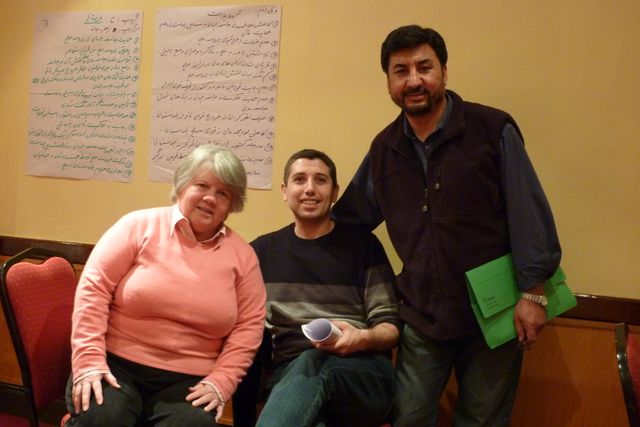Comparative perspectives for Afghan peacebuilders
A workshop for peacebuilders from across Afghanistan provided a variety of comparative perspectives – including from the former Yugoslavia and Northern Ireland – designed to strengthen their own peacebuilding efforts.
An 17-strong delegation of peacebuilders from throughout Afghanistan participated in a peacebuilding workshop in Dublin from 22nd – 27th February. The main purpose of the workshop – organized by the British and Irish Agencies Afghanistan Group (BAAG), a coordinating agency comprised of 28 members – was to explore what kind of peacebuilding Afghanistan requires, and in what contexts such peacebuilding needs to happen.
The workshop was ably facilitated by Sue Williams, who has extensive experience in the field of peacebuilding in a variety of countries (including Rwanda, Northern Ireland, Cambodia and Kenya), and has served as a special consultant to the Folke Bernadotte Academy in Stockholm, Sweden. The worshop was co-facilitated by Mr. Fahim Hakim, an outgoing Commissioner of Afghanistan’s Independent Human Rights Commission. Ms. Williams and Mr. Hakim guided the participants through an extensive process of reflection upon the sort of peacebuilding work they deem necessary, combined with practical steps for formulating a coherent strategy for the future.
@BAAG/Ewa Figaszewska
Sean McGearty and Ian White, from the Glencree Centre for Peace and Reconciliation, provided an extensive overview of the Irish peace process, elucidating some of the key drivers of the conflict and how they were transformed. Mr. Williams, in particular, emphasized how there is “no sustainable security solution to a security problem…[that] military measures to solve violent conflict often has an adverse effect” and that one does not “need to trust the other party to build peace with them… in the Irish context, what they did trust was the process – peace is a process”.
Michael Semple – an Irish expert on Afghanistan, particularly the Taliban and Pashtun Tribes, who has previously served as the deputy to the EU Special Representative for Afghanistan and is currently a fellow at Harvard University’s Carr Center – spoke about the historical dimensions of peacebuilding in Afghanistan, including important examples from the eighties and nineties (i.e. prior to the US-led invasion in 2003) and the prospects for the future, particularly given the prospect of NATO’s withdrawal and the upcoming presidential elections). Semple emphasized the importance of articulating a role for civil society in the process of securing a sustainable settlement.
Ian Bancroft, TransConflict’s co-founder and executive director, provided a variety of insights into peacebuilding in the former-Yugoslavia, focusing in particular on Bosnia-Herzegovina and the challenges of ethnically-divided post-war societies. Fostering inter- and intra-ethnic dialogue, reintegrating former combatants into society and dealing with the legacy of war crimes were some of the areas in which the participants garnered important lessons for their own peacebuilding work.
TransConflict will continue – as part of the Global Coalition for Conflict Transformation – to engage with the peacebuilders in question, and hopes to foster ties between Afghanistan and peacebuilding organizations from throughout the former Yugoslavia. Whilst the contexts and causes of conflict can be extremely different, the inspiration and innovation provided by comparative peacebuilding examples and experiences serves to foster new approaches and methodologies.



















